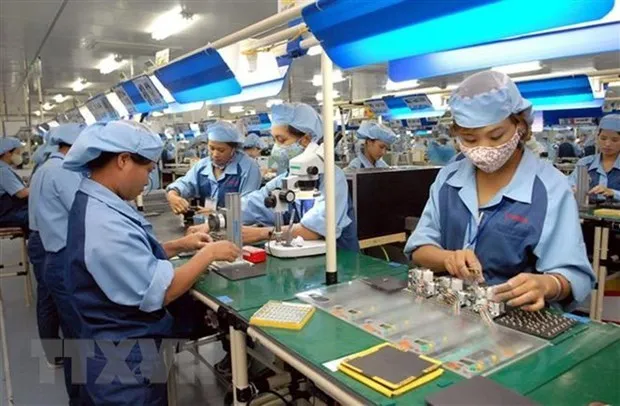
Mr. Toàn highlighted several factors contributing to this positive outlook, including political stability, elevated economic expectations, improved diplomatic relations, and the potential to attract high-quality FDI from the US, Europe, and other global partners. He emphasized that if Vietnam is well-prepared, it could witness the onset of a new wave of foreign investment.
In 2023, Vietnam achieved a record-breaking figure of registered FDI capital amounting to USD 36.6 billion, marking a notable increase of 32.1% compared to the previous year. The year saw the establishment of 3,188 new projects, a remarkable rise of 62.2%, with a total investment of USD 20.19 billion - an increase of 56.6% in project numbers and 62.2% in registered capital, despite intense global competition for FDI.
The year 2023 witnessed several milestones in attracting foreign investments. In March, a delegation of 52 prominent American businesses, including industry giants like Boeing, SpaceX, Netflix, and Apple, visited Vietnam to explore collaboration opportunities. In June, during the official visit of Korean President Yoon Suk Yeol, 205 business leaders, including top executives from leading Korean corporations such as Samsung Electronics, SK, Hyundai Motor, LG, and Lotte, participated. In September, US President Joe Biden's state visit to Vietnam resulted in the official upgrade of bilateral relations to a comprehensive strategic partnership, accompanied by substantial cooperation and investment agreements worth billions of dollars. Furthermore, in December, General Secretary and President of China Xi Jinping visited Vietnam, solidifying and elevating the comprehensive strategic cooperative partnership between the two countries.
Mr. Toàn expressed confidence that the convergence of political stability, macroeconomic stability, promising economic growth, and successful diplomatic relations has created a significant opportunity for Vietnam to attract a substantial influx of FDI in 2024. He believes that with adequate preparation, 2024 could mark the beginning of a new wave of foreign investment in the country.
JOURNALIST: - The expectation is to usher in a new era in attracting a new generation of higher-quality FDI capital. How ready is Vietnam for this, sir?
Mr. NGUYỄN VĂN TOÀN: - I see that the government is well-prepared; however, there is still a gap between readiness and reality. Reflecting on 2008, when Vietnam joined the WTO, there was a surge in FDI, but the absorption capacity was lacking, leading to low disbursement. Now, with more initiative and the ability to be selective, we must learn from past lessons to capitalize on opportunities and create a qualitative turning point in FDI attraction.
Vietnam possesses potential in rare earths, semiconductor chip production, and emerging industries. To leverage this potential, we need to prepare by developing quality human resources and fostering capable domestic enterprises. Additionally, careful consideration of policies supporting investors in light of the application of the global minimum tax is crucial.
While attracting new investors is essential, retaining current investors is equally vital. Existing investors serve as evidence, ambassadors for Vietnam, and contribute to deepening the country's investment appeal. With Resolution 50, Vietnam has become more selective, prioritizing high-tech FDI projects, source technology, and creating linkages with the domestic business sector. This resolution marks a shift toward choosing partners strategically, focusing on cooperation for mutual development to enhance the quality of FDI capital flows, rather than pursuing FDI at any cost. Despite the emphasis on attracting FDI, Vietnam remains committed to protecting the environment, labor rights, and elevating the value of its workforce, recognizing that competition based solely on price, cheap labor, or tax incentives is not sustainable.
- Recently, Chinese investment in Vietnam has surged, but there's a noticeable apprehension in some localities. What is your opinion on this matter?
- I understand that many localities may lack the capacity to appraise and evaluate technology. When faced with a project from a Chinese investor, they may harbor concerns. However, it's crucial not to generalize, as not all Chinese investors are low-tech or environmentally unfriendly. Notably, there has been a rise in large-scale, high-tech Chinese investment projects in Vietnam, such as the Jinko Solar Hai Ha Vietnam photovoltaic cell technology complex with a total investment of USD 1.5 billion. In 2023, China ranked as the second-largest investor in Vietnam, accounting for 17.6% of total investment.
The key lies in elevating our capability to assess and select projects. We already have a filtering mechanism, the environmental impact report, which serves as a demonstration of technology. The challenge is strict and rigorous enforcement. Provinces must actively choose high-quality projects aligned with the global trends of sustainable development, innovation, and environmental responsibility. This approach ensures Vietnam keeps pace with other nations in the pursuit of growth and development.
- Thank you very much.




















